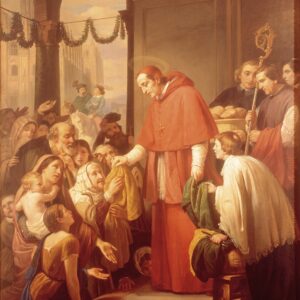 Celebramos hoy la Fiesta de San Carlos Borromeo, un santo que tomó muy en serio las palabras de Jesús; “Quien ahorra su vida, la pierde, pero el que gasta su vida por Mí, la ganará.” San Carlos jugó un papel importante en convencer a Pío IV para continuar el Concilio de Trento, que buscaba acabar con la corrupción de la iglesia del siglo XVI asediada por el protestantismo.
Celebramos hoy la Fiesta de San Carlos Borromeo, un santo que tomó muy en serio las palabras de Jesús; “Quien ahorra su vida, la pierde, pero el que gasta su vida por Mí, la ganará.” San Carlos jugó un papel importante en convencer a Pío IV para continuar el Concilio de Trento, que buscaba acabar con la corrupción de la iglesia del siglo XVI asediada por el protestantismo.
En 1563, San Carlos comenzó y supervisó la escritura de una nueva edición del catecismo, reescribió los textos litúrgicos y la música, y comenzó a aplicar la reforma clerical en Roma. En general mostraba su lado amable por lo que el pueblo lo amaba. Durante una plaga en 1576, permaneció en la ciudad al cuidado de los enfermos, ordenó que muchos de los adornos ostentosos de las iglesias se retiraran y se usaran para confeccionarles ropa a los indigentes. Durante una hambruna se endeudó para alimentar a más de sesenta mil personas. En tiempos más ordinarios, le gustaba recorrer la ciudad rezando con el pueblo. Fundó hospitales, escuelas, orfanatos y otras instituciones de caridad.
San Carlos fue en enérgico reformista sirviendo a Dios como un instrumento en la revitalización de la Iglesia durante la Contrarreforma. Su obra, se dice, “le otorgó nueva confianza a una iglesia en problemas.” Es el Santo patrón de los catequistas.
Oremos. “O Dios, te damos gracias por darnos el ejemplo de San Carlos Borromeo: modelo de fe, de humildad, de pureza, de virtudes, y de constancia en el sufrimiento. Concede a nosotros que seamos fieles a su ejemplo de firmeza en nuestros propósitos, y fuerte espíritu de sacrificio, tenacidad, y constancia, para el bien de nuestras vidas, almas, y mente. Por Jesucristo nuestro Señor. Amén.”
***
No age of the Catholic Church’s history is without its share of confusion and corruption. Still, even in moments when disorder may seem overwhelming, individuals and movements eventually arise to propose the faith with clarity and demonstrate it in action. St. Charles Borromeo, a central figure in the Council of Trent, is remembered today as a model of such leadership in difficult times.
In the mid-1500’s, St. Charles found himself urgently needed in the work of concluding the Council of Trent. The Church’s nineteenth Ecumenical Council had begun, but experienced many delays. Its twofold mission was to clarify Catholic doctrine against Protestant objections, and reform the Church internally against many longstanding problems. As a papal representative, Charles participated in the council’s conclusion in 1563, when he was only 25. He also played a leading role in assembling its comprehensive summary, the Roman Catechism (or Catechism of the Council of Trent).
In “reward” for his labors, Charles received even greater responsibilities! He was named Archbishop of Milan and got straight to work establishing schools, seminaries, and centers for religious life. His reforms of the archdiocese, in accordance with the decrees of the Council, were dramatic and effective, so much so that a group of disgruntled monks attempted to kill him. His survival was called miraculous.
St. Charles’ amazing diligence, frequent travel, and ascetic living eventually took their toll. He died young at the age of 46 on November 3, 1584. He is the patron of catechists and catechumens.
Let us pray. “Lord, preserve in the midst of your people the spirit with which you filled Saint Charles Borromeo, that your Church may be constantly renewed and, by conforming herself more and more to the likeness of Christ, may show His face to the world. Who lives and reigns with you for ever and ever. Amen.”

